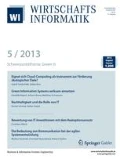Literatur
Alavi, M.; Leidner, D.: Knowledge Management Systems: Emerging Views and Practices from the Field. In: Nunamaker, J.F.; Sprague, R.H. (Hrsg.): Proc. 32th Hawaii Int. Conference on System Sciences, IEEE: Los Alamitos et al. 1999.
APQC American Productivity & Quality Center: Knowledge Management — Consortium Benchmarking Study Final Report. In: APQC, Houston 1996.
Bode, J.: Der Informationsbegriff in der Betriebswirtschaftslehre. In: Zeitschrift für betriebswirtschaftliche Forschung Zfbf 49 (1997) 5, S. 449–468.
Bonora, E.A.; Revang, O.: A Framework for Analysing the Storage and Protection of Knowledge in Organizations. In: Lorange, P.; Chakravarthy, B.; Ross, J.; v.d. Ven, A. (Hrsg.): Implementing Strategic Processes. Oxford/Cambridge 1993, S. 190–213.
Bullinger, H.-J.; Warschat, J.; Prieto, J.; Wörner, K.: Wissensmanagement — Anspruch und Wirklichkeit: Ergebnisse einer Unternehmensstudie in Deutschland. In: Information Management & Consulting 13 (1998) 1, S.7–23.
Davenport, TH.; Long, D.W.d.; Beers, M.C.: Successful Knowledge Management Projects. In: Sloan Management Review 39 (1998) 4, S. 43–57.
Dyer, G.: KM Crosses the Chasm. In: Knowledge Management Magazine (2000) 3.
Eisenberg: Reengineering and Dumbsizing: Mismanagement of the Knowledge Resource. In: IEEE Engineering Management Review 26 (1998) 3, S. 78–86.
Eulgem, S.: Die Nutzung des unternehmensinternen Wissens — Ein Beitrag aus Sicht der Wirtschaftsinformatik. Lang, Frankfurt a. M. et al. 1998.
Fahey, L.; Prusak, L.: The Eleven Deadliest Sins of Knowledge Management. In: California Management Review 40 (1998) 3, S. 265–276.
Fitter, F.: The Human Factor. In: KM Magazine (1999) 6; aus: http://www.kmmag.com/kmagn2/kml99906/featurebl.htm; Abruf am 1999–11–08.
Hansen, M. T.; Nohna, N.; Tierney, T.: What’s Your Strategy For Managing Knowledge. In: Harvard Business Review 77 (1999) 2, S. 106–116.
Hasenkamp, U.; Roßbach, P.: Wissensmanagement. In: Das Wirtschaftsstudium WISH 27 (1998) 8–9, S. 956–964.
Heilmann, H.: Wissensmanagement — ein neues Paradigma. In: Praxis der Wirtschaftsinformatik HMD 36 (1999) 208, S.7–23.
Heisig, P.: Erfahrung sichern und Wissen transferieren: Wissensmanagement im Projektmanagement. In: Projektmanagement 9 (1998) 4, S. 3–10.
Heisig, P.: Wissensmanagement in Deutschland und Europa: Stand und Entwicklungen. In: Proc. Aufbruch ins Wissensmanagement. DGI, Frankfurt 1999, S. 53–66.
Hildebrand, C.: The Greater Good. In: CIO Magazine, 8 (1994) 4, S. 32–40.
Holloway, P.: Sharing Knowledge — And Other Unnatural Acts. In: Knowledge Managemement Magazin (2000) 1.
Hönicke, I.: Wissens-Management wird zum entscheidenden Wettbewerbsvorteil. In: Computerwoche-Extra (1999) 1, S. 18–19.
Huang, K.-T.: Capitalizing on Intellectual Assets. In: IBM Systems Journal 37 (1998) 4, S. 570–583.
King, J.: Knowledge Management Promotes Sharing. In: Computerworld 32 (1998) vom 1998–06–15.
KPMG: Knowledge Management Research Report 2000. In: KPMG Consulting (Hrsg.). London 2000.
Krogh, G.v.: Care in Knowledge Creation. In: California Management Review 40 (1998) 3, S. 133–
Liedtka, J.M.; Haskins, M.E.; Rosenblum, J.W.; Weber, J.: The Generative Cycle: Linking Knowledge and Relationships. In: Sloan Management Review 38 (1997) 1, S. 47–58.
Lucier, C.E.; Torsilien, J.D.: Why Knowledge Programs Fail: A C.E.O.’s Guide to Managing Learning. In: Strategy & Business (1997) 4, S. 14–28.
Mahé, S.; Rieu, C.: A Pull Approach to Knowledge Management. In: Reimer, U. (Hrsg.): Practical Aspects of Knowledge Management PAKM98. Basel 1998, S. 18.1–18.9.
Maier, R.; Lehner, F.: Daten, Informationen, Wissen. In: Lehner, F.; Hildebrand, K.; Maier, R. (Hrsg.): Wirtschaftsinformatik — Theoretische Grundlagen. Carl Hanser, München-Wien 1995, S. 165–272.
Manville, B.; Foote, N.: Harvest your Workers’ Knowledge. In: Datamation (1996) 7, S. 78–81.
McDermott, R.: Why Information Technology Inspired but Cannot Deliver Knowledge Management. In: California Management Review 41 (1999) 4, S. 103–117.
Miles, G.; Miles, R.E.; Perrone, V.; Edvmssen, L.: Some Conceptual and Research Barriers to the Utilization of Knowledge. In: California Management Review 40 (1998) 3, S.281–288.
Nelson, K.M.; Cooprider, J.G.: The Contribution of Shared Knowledge to IS Group Performance. In: MIS Quarterly 20 (1996) 4, S. 409–432.
Nissen, M.; Kamel, M.; Sengupta, K.: Integrated Analysis and Design of Knowledge Systems and Processes. In: Information Resources Management Journal 13 (2000) 1, S. 24–43.
Nonaka, I.: The Knowledge-Creating Company. In: Harvard Business Review 69 (1991) 6, S. 96–104.
Nonaka, I.: A Dynamic Theory of Organizational Knowledge Creation. In: Organization Science 5 (1994) 2, S. 14–37.
Nonaka, I.; Konno, N.: The Concept of „Ba”: Building a Foundation for Knowledge Creation. In: California Management Review 40 (1998) 3, S. 40–54.
Nonaka, L.; Krogh, G.v.: Wissens-Hysterie. In: Manager Magazin (1999) 4, S. 164.
Peters, B.: Wissensmanagement — Kür oder Pflicht?. In: Personalführung (1999) 12, S. 1.
Preissler, H.; Roehl, H.; Seemann, P.: Haken, Helm und Seil: Erfahrungen mit Instrumenten des Wissensmanagements. In: Organisationsentwicklung (1997) 2, S. 4–16.
Probst, G.; Knaese, B.: Führen Sie Ihre „Knowbodies” richtig?. In: io Management Zeitschrift 67 (1998) 4, S. 38–41.
Quinn, J.B.; Anderson, P.; Finkelstein, S.: Managing Professional Intellect: Making the Most of the Best. In: Harvard Business Review 74 (1996) 2, S. 71–80.
Rehäuser, J.; Krcmar, H.: Wissensmanagement im Unternehmen. In: Schreyögg, G.; Conrad, P. (Hrsg.): Wissensmanagement. de Gruyter, Berlin-New York 1996, S. 1–40.
Reimus, B.: Knowledge Sharing Within Management Consulting Firms. 1997. http://www.kennedyinfo.com/mc/gware.html; Abruf am 1999–02–09.
Ruggles, R.: The State of the Notion: Knowledge Management in Practice. In: California Management Review 40 (1998) 3, S. 80–89.
Russell, R.H.: Providing Access: The Difference between Sharing and Just Reporting Corporate Information. In: Information Strategy 12 (1996) 2, S. 28–33.
Schrage, M.: Why no on wants Knowledge Management. In: Computerworld, 1998–12–07.
Snowden, D.: Three Metaphors, two stories and a picture — how to build common understanding to KM through metaphor. In: Knowledge Management Review 7 (1999) 2, S. 30–33.
Wenger, E.C.; Snyder, W.M.: Communities of Practice: Warum sie eine wachsende Rolle spielen. In: Harvard Business Manager 22 (2000) 4, S. 55–62.
Whiting, R.: Knowledge Management: Myths and Realities. In: Informationweek Online, 1999-11-22, S. 1–5.
Wiig, K.M.: Knowledge Management: Where did it Come From and Where will it Go? In: Expert Systems with Applications 13 (1997) 1, S. 1–14.
Wittmann, W.: Unternehmung und unvollkommene Information. Köln, Opladen 1959.
Zack, M.H.: Managing Codified Knowledge. 1998, für: Sloan Management Review 40 (1999) 4. http://www.cba.neu.edu/~mzack/articles/kmarch/kmarch.htm; Abruf am 1999-11-01.
Author information
Authors and Affiliations
Corresponding author
Rights and permissions
About this article
Cite this article
Disterer, G. Individuelle und soziale Barrieren beim Aufbau von Wissenssammlungen. Wirtschaftsinf 42, 539–546 (2000). https://doi.org/10.1007/BF03250771
Issue Date:
DOI: https://doi.org/10.1007/BF03250771

